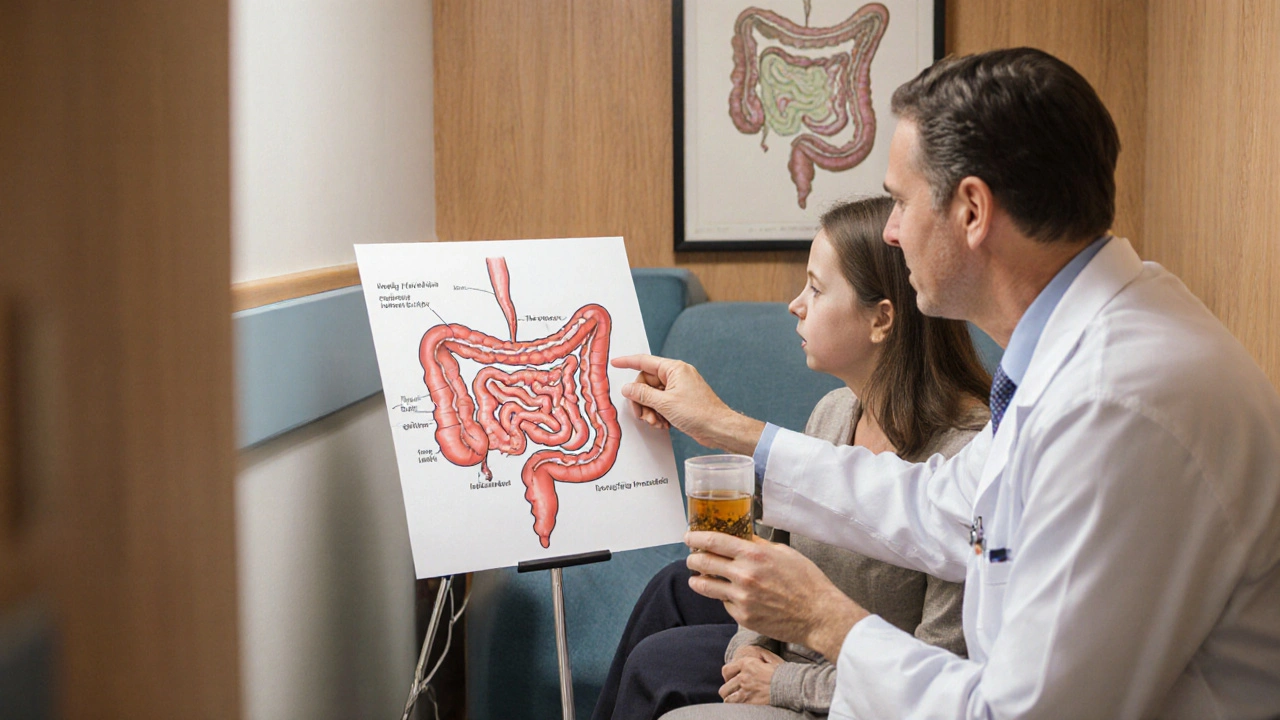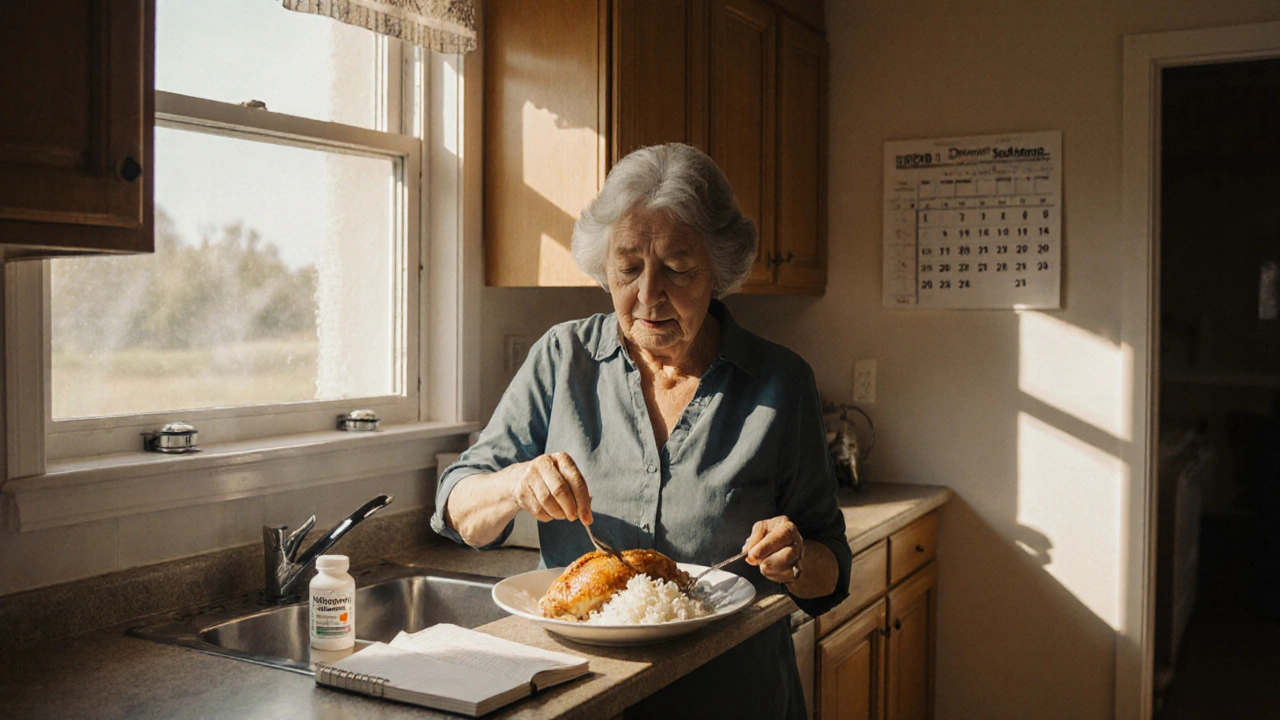Ulcerative colitis isn’t just occasional stomach trouble. It’s a lifelong condition where your colon and rectum become chronically inflamed, leading to open sores, bloody diarrhea, and constant pain. Unlike a bad meal or a virus, this inflammation doesn’t go away on its own. It comes and goes in waves-sometimes quiet for months, other times flaring up with brutal force. If you’re living with it, you know the fear of sudden urgency, the exhaustion from lost sleep, and the isolation that comes from never knowing when the next flare will hit. But here’s the truth: ulcerative colitis can be managed. Many people live full, active lives with long periods of remission. The key isn’t just medication-it’s understanding what’s happening inside your body and how to work with it.
What Exactly Happens in Your Colon?
- Your colon’s inner lining gets attacked by your own immune system-like an internal betrayal.
- This attack causes swelling, tiny ulcers, and constant bleeding.
- The inflammation doesn’t skip areas. If it starts in the rectum, it moves upward in a continuous line, never jumping over healthy tissue.
- It only affects the innermost layer of the colon wall. This is different from Crohn’s disease, which can punch through all layers and show up anywhere from mouth to anus.
There are five main types of ulcerative colitis, each defined by how far the inflammation spreads:
- Ulcerative proctitis: Only the rectum is involved. Symptoms are usually milder-rectal bleeding, occasional urgency.
- Proctosigmoiditis: Affects the rectum and the lower part of the colon (sigmoid colon). More frequent bloody stools and cramps.
- Left-sided colitis: Inflammation reaches up to the splenic flexure (near the spleen). Left-sided abdominal pain, weight loss, and more than 10 bowel movements a day.
- Pancolitis: The entire colon is inflamed. Severe symptoms: constant bloody diarrhea, fever, extreme fatigue, significant weight loss.
- Rectal-sparing colitis: Rare. The colon is inflamed, but the rectum stays untouched.
The more of your colon that’s affected, the worse the symptoms tend to be. Pancolitis patients often have stools that are almost all blood and pus. Proctitis patients might only notice a few drops of blood after a bowel movement. But no matter the type, one thing is always present: blood in the stool. It’s the most consistent sign-reported in nearly 100% of cases.
What Triggers a Flare-Up?
People often blame stress or food for causing ulcerative colitis. That’s not true. But those things? They can turn a quiet period into a full-blown flare.
Here’s what actually triggers symptoms:
- Stress: Not the cause, but a powerful accelerator. High stress can make your immune system go into overdrive.
- Specific foods: Dairy, spicy foods, caffeine, alcohol, and high-fiber foods like raw veggies or nuts can irritate an inflamed colon. But triggers vary wildly from person to person.
- Antibiotics: Can disrupt your gut bacteria, which may trigger a flare.
- Infections: A stomach bug or other illness can destabilize your gut environment.
- Skipping medication: Even one missed dose can be enough to reignite inflammation.
One study tracked patients for over a year and found that 72% of flare-ups were linked to one or more of these triggers-not to the disease itself suddenly worsening. That means you have more control than you think.
Other Parts of Your Body Can Be Affected Too
Ulcerative colitis doesn’t stay in your gut. About 1 in 3 people experience symptoms outside the digestive tract:
- Red, burning eyes (uveitis or episcleritis)
- Painful, swollen joints-often knees, ankles, or wrists
- Red, tender lumps under the skin (erythema nodosum)
- Painful mouth ulcers
- Nausea and vomiting during severe flares
These are called extraintestinal manifestations. They often appear at the same time as a gut flare. If you notice new joint pain or skin changes, don’t assume it’s unrelated. Tell your doctor. Treating the colon inflammation often helps these other symptoms fade too.

How Do You Get Into Remission?
Remission doesn’t mean you’re cured. It means the inflammation has calmed down, symptoms are gone, and your colon is healing. The goal isn’t just to feel better-it’s to prevent long-term damage and lower your cancer risk.
Here’s how remission is achieved, step by step:
- Start with 5-ASAs: Medications like mesalamine (Asacol, Lialda) or sulfasalazine are first-line for mild to moderate cases. They’re anti-inflammatory pills or suppositories that target the colon directly. Many people stay in remission for years on these alone.
- Move to immunomodulators: If 5-ASAs aren’t enough, drugs like azathioprine or 6-MP suppress the immune system more broadly. These take 3-6 months to work fully, so they’re paired with faster-acting meds at first.
- Biologics for stubborn cases: These are injectable or IV drugs (like infliximab, adalimumab, vedolizumab) that block specific proteins driving inflammation. They’re powerful-up to 60% of patients achieve remission after 6 months. But they require regular monitoring for infections.
- Consider surgery if needed: If medications fail or you develop precancerous changes, removing the colon (colectomy) is the only cure. After surgery, most people live without symptoms and don’t need ongoing meds.
One key point: remission isn’t just about symptoms disappearing. Your doctor will check your colon with a colonoscopy to see if the tissue is truly healing. That’s how you know the disease is under control-not just your stomach.
Diet and Nutrition: What to Eat, What to Avoid
There’s no single “UC diet.” But during flares, your gut is hypersensitive. Here’s what works for most people:
- During flares: Stick to low-fiber, low-residue foods. White rice, bananas, applesauce, boiled eggs, skinless chicken, and well-cooked carrots. Avoid raw veggies, whole grains, nuts, and seeds.
- During remission: Slowly reintroduce fiber. Start with cooked veggies, oats, and soft fruits. Fiber helps maintain a healthy gut lining and reduces cancer risk long-term.
- Hydration is critical: Diarrhea drains fluids and electrolytes. Drink water, broth, or oral rehydration solutions. Avoid sugary drinks-they can make diarrhea worse.
- Small, frequent meals: Easier on your gut than three large meals.
- Keep a food diary: Track what you eat and how you feel. You’ll find your own triggers.
Some people swear by the low-FODMAP diet, but it’s not for everyone. It’s best tried under the guidance of a dietitian who understands IBD. Don’t starve yourself trying to “cure” UC with diet alone. Medication is still the backbone of treatment.

Long-Term Risks and Monitoring
Living with ulcerative colitis for more than 8-10 years raises your risk of colon cancer. That’s why regular colonoscopies are non-negotiable.
- If you have ulcerative proctitis, your cancer risk is very low. Screening every 5-10 years may be enough.
- If you have pancolitis, you need a colonoscopy every 1-2 years after 8 years of disease.
- During the colonoscopy, your doctor takes small tissue samples to check for dysplasia-early cell changes that can lead to cancer.
Other risks include severe bleeding, toxic megacolon (a rare but life-threatening dilation of the colon), and malnutrition from poor absorption. That’s why staying on your treatment plan matters-not just for comfort, but for survival.
Can You Live a Normal Life?
Yes. But it takes work.
People with ulcerative colitis work full-time jobs, travel, have kids, and run marathons. But they do it differently. They plan bathroom breaks. They carry emergency supplies. They know their triggers. They don’t skip meds because they “feel fine.”
One patient I spoke with-38, lives in Bristol, has had UC since she was 22-said this: “I don’t live in fear anymore. I live with a plan. My flare-ups used to rule me. Now, I rule them.”
The CDC says most people with UC can lead active lives. That’s not empty optimism. It’s backed by data. With the right treatment, up to 70% of people achieve long-term remission. The tools exist. You just need to use them consistently.
Can ulcerative colitis be cured?
There’s no medical cure for ulcerative colitis, but removing the colon (colectomy) is the only way to eliminate the disease entirely. For most people, medication and lifestyle changes can bring the disease into long-term remission, meaning symptoms disappear and the colon heals. Many live decades without a flare.
Is ulcerative colitis the same as Crohn’s disease?
No. Both are types of inflammatory bowel disease, but they’re different. Ulcerative colitis only affects the colon and rectum, and only the inner lining. Crohn’s can affect any part of the digestive tract, from mouth to anus, and it goes through all layers of the intestinal wall. Crohn’s often has “skip lesions”-patches of healthy tissue between inflamed areas. UC’s inflammation is continuous.
Do stress and diet cause ulcerative colitis?
No. The exact cause is unknown, but it’s linked to immune system dysfunction, genetics, and gut bacteria. Stress and certain foods don’t cause UC, but they can trigger flare-ups in people who already have it. Blaming yourself for “making it worse” is common-but it’s not your fault.
What’s the best medication for ulcerative colitis?
There’s no single “best” medication-it depends on how severe your disease is. For mild cases, 5-ASAs like mesalamine are first-line. For moderate to severe, immunomodulators or biologics are used. Biologics like vedolizumab or ustekinumab are highly effective for many and have fewer long-term side effects than older drugs. Your doctor will choose based on your symptoms, disease extent, and past responses.
Can I still travel with ulcerative colitis?
Absolutely. Many people with UC travel regularly. Plan ahead: know where bathrooms are, carry extra medication and supplies, bring a doctor’s note for airport security if you’re carrying injectables, and avoid risky foods. Some people use apps that locate public restrooms. Don’t let fear stop you-just prepare.
Will I need surgery?
Not everyone does. Surgery is usually considered if medications stop working, you have severe complications like toxic megacolon or heavy bleeding, or if precancerous changes appear on colonoscopy. About 20-30% of people with UC eventually need a colectomy. After surgery, most people feel much better and no longer need daily meds.
How often should I have a colonoscopy?
If you’ve had ulcerative colitis for 8-10 years, you should have a colonoscopy every 1-2 years to screen for cancer. If your disease is limited to the rectum (proctitis), you may only need one every 5-10 years. Your doctor will tailor the schedule based on your disease extent, family history, and past biopsy results.
What’s Next?
If you’ve just been diagnosed, give yourself time. It’s overwhelming. But you’re not alone. Start by finding a gastroenterologist who specializes in IBD. Keep a symptom and food journal. Learn your triggers. Stick to your meds-even when you feel fine. Connect with support groups. The more you understand your body, the less power the disease has over you.
Remission isn’t a miracle. It’s a daily choice. One pill. One meal. One hour of rest. One conversation with your doctor. Over time, those choices add up to a life that’s not defined by your colon.

Lashonda Rene
November 7, 2025 AT 15:53i just got diagnosed last month and honestly i thought i was gonna die or something like that. but reading this made me feel less alone. i used to think it was my fault for eating too much spicy food or being stressed out, but now i get it-it’s not me, it’s my body fighting itself. i’ve started keeping a food diary like they said, and i already noticed that dairy makes me feel like i’m gonna explode. also, i miss pizza so bad but i’m trying to be patient. i’m not cured, but i’m learning to live with it, not be scared of it.
Andy Slack
November 7, 2025 AT 18:02Remission is possible. I’ve been in it for 7 years. Medication isn’t optional. It’s your armor. Skip it once, and you’ll regret it. I used to think I was fine. I wasn’t. Now I take my mesalamine like it’s my morning coffee. No excuses.
Rashmi Mohapatra
November 9, 2025 AT 10:06people always say 'diet fixes everything' but nooo it dont. i had pancolitis and i ate nothing but rice and bananas for 6 months. still flared. meds saved me. biologics are expensive but worth it. dont listen to instagram healers. they dont know what colon looks like.
Abigail Chrisma
November 9, 2025 AT 21:08To anyone new to this: you’re not broken. You’re not weak. You’re not failing because you have bad days. This disease doesn’t define you, but how you respond to it? That’s where your strength shows. I’ve traveled to 12 countries with UC. I’ve held my baby while crying from cramps. I’ve laughed with friends while hiding in a bathroom. You can still live. You just have to plan. And ask for help. No shame in that.
Ankit Yadav
November 11, 2025 AT 10:11colonoscopy every 1-2 years after 8 years? yes. dont skip. i ignored mine for 3 years. found dysplasia. had to get colectomy. not fun. but better than cancer. your doc is your ally. dont ghost them. also hydration. drink water. not soda. your colon will thank you
Meghan Rose
November 13, 2025 AT 08:17ok but like… why are we even talking about this like it’s a lifestyle hack? it’s a chronic autoimmune disease. you can’t ‘manage’ it like a to-do list. some of us are on 5 meds, 3 infusions a year, and still flaring. this post makes it sound like if you just eat right and take your pills you’ll be fine. what about the people who aren’t? where’s the validation for that? i’m tired of toxic positivity.
Steve Phillips
November 15, 2025 AT 07:02Oh wow. Just… wow. You mean to tell me that after centuries of medical advancement, we’re still just throwing 5-ASAs at people like it’s 1998? And biologics? Those are basically chemical warfare with a $20,000 price tag. And don’t even get me started on the 'low-FODMAP diet'-it’s the keto of IBD: a fad that makes people feel better temporarily while starving their microbiome. Honestly, if you’re not getting a fecal transplant by year two, you’re doing it wrong. Also, colonoscopy? Please. They’re basically medieval torture devices with a camera. Why not just MRI? Oh right-because insurance won’t cover it. Welcome to modern medicine, folks.
Rachel Puno
November 15, 2025 AT 18:46when i first started feeling sick i thought it was just food poisoning. then i bled for 3 days straight and my mom made me go to the doctor. i was 19. i cried for a week. but now? i’m 31. i run marathons. i bake bread. i travel. it’s not easy. but it’s possible. take your meds. talk to your doc. find your people. you’re not alone. i promise.
Clyde Verdin Jr
November 16, 2025 AT 09:41LOL this is the most ‘feel-good’ UC article I’ve ever read. Like, ‘oh just take your pills and you’ll be fine!’ Meanwhile, I’m on infliximab, have a colostomy bag, and still get joint pain. Also, ‘you can live a normal life’? Normal for who? The people who didn’t lose their jobs? Who didn’t get divorced? Who didn’t cry in a gas station bathroom because they couldn’t find a toilet? This post is for people who got lucky. Not the rest of us.
Key Davis
November 17, 2025 AT 10:15It is imperative to underscore that the clinical management of ulcerative colitis necessitates a multidisciplinary approach encompassing pharmacological intervention, nutritional counseling, and psychological support. The assertion that remission is achievable through consistent adherence to therapeutic protocols is empirically validated by longitudinal cohort studies. I encourage all patients to maintain rigorous documentation of symptomatology and dietary intake, as this facilitates personalized care pathways. Furthermore, the temporal correlation between psychosocial stressors and disease exacerbation is well-documented in peer-reviewed gastroenterological literature.
Cris Ceceris
November 18, 2025 AT 14:01I’ve been thinking a lot about how we treat chronic illness like it’s a puzzle you solve once and forget. But it’s more like a river-you don’t control the current, you learn to swim with it. Some days I feel like I’ve got it figured out. Other days, I’m just trying not to cry in the bathroom. Maybe the goal isn’t to ‘beat’ it. Maybe it’s to stop fighting yourself. To accept that some days, just getting out of bed is the win.
Brad Seymour
November 20, 2025 AT 05:36My mate had a colectomy last year. Now he’s hiking the Pennine Way. No meds. No flares. Just… freedom. I know it sounds scary, but if meds aren’t working, surgery isn’t defeat-it’s liberation. Don’t let fear stop you from asking the question: ‘What if I could feel normal again?’
Malia Blom
November 20, 2025 AT 08:07Let’s be real-this whole ‘remission’ thing is a scam. The cancer risk is real. The meds have side effects that’ll make you question your sanity. And the ‘you can live a normal life’ narrative? That’s just the medical-industrial complex selling hope to keep you compliant. You’re not ‘managing’ anything-you’re surviving a system that doesn’t care if you live or die, as long as you keep buying the drugs.
Lashonda Rene
November 21, 2025 AT 02:14to the person who said ‘you’re not broken’-thank you. i read that and cried. i’ve been feeling like a burden. like my body betrayed me and now i’m broken. but you’re right. i’m not broken. i’m just tired. and that’s okay. i’m still here. still trying. still learning. and i’m not giving up.